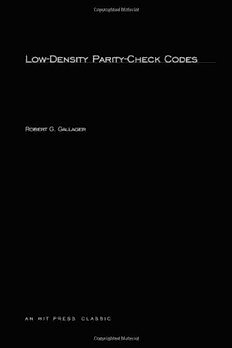
Low-Density Parity-Check Codes PDF
90 Pages·1963·0.624 MB·English
Most books are stored in the elastic cloud where traffic is expensive. For this reason, we have a limit on daily download.
Preview Low-Density Parity-Check Codes
Description:
This is a complete presentation of all important theoretical and experimental work done on low-density codes. Low-density coding is one of the three techniques thus far developed for efficient communication over noisy channels with an arbitrarily low probability of error.A principal result of information theory is that if properly coded information is transmitted over a noisy channel at a rate below channel capacity, the probability of error can be made to approach zero exponentially with the code length. Any practical use of this theorem, however, requires a coding scheme in which the cost of storage and computation equipment grows slowly with code length. The present book analyzes a class of coding schemes for which costs grow approximately linearly with code length. It demonstrates that error probability approaches zero exponentially with a root of the block length and cites experimental evidence that this coding scheme has profitable aplicability in many communications situations.
See more
The list of books you might like
Most books are stored in the elastic cloud where traffic is expensive. For this reason, we have a limit on daily download.
